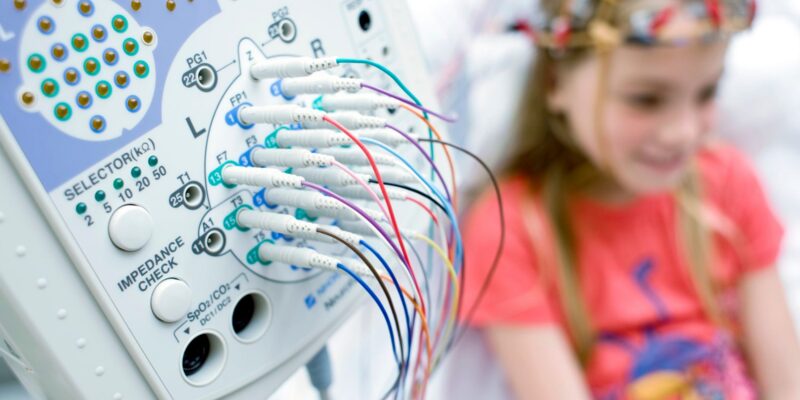When a child shows signs of developmental delays, coordination problems, or learning challenges, parents often…

The Connection Between Sleep Disorders and Neurological Health: Why Quality Sleep Matters
Sleep isn’t just about feeling rested—it’s essential for brain function. Could your sleep struggles be linked to a neurological issue? Many people experience ongoing sleep problems without realizing that their brain health may be playing a role. The relationship between sleep disorders and neurological health is complex, with conditions like insomnia, sleep apnea, and restless leg syndrome often tied to underlying neurological issues. Understanding this connection is the first step toward effective sleep disorder treatment in NJ and improved overall well-being.
How Sleep and Brain Health Are Connected
Sleep plays a vital role in cognitive function, memory retention, and emotional regulation. During deep sleep, the brain clears out toxins, consolidates memories, and prepares for the next day’s challenges. However, poor sleep quality can have serious consequences for brain health.
Research shows that a lack of sleep affects the brain through:
- Increased risk of cognitive decline and neurodegenerative diseases like Alzheimer’s.
- Impaired focus, decision-making, and emotional regulation.
- Heightened risk of stroke and cardiovascular issues due to oxygen deprivation and inflammation.
Because of this, addressing neurology and sleep disorders is essential for long-term brain health and overall wellness.
Common Neurological Sleep Disorders
Several neurological conditions contribute to chronic sleep disturbances. Identifying and treating these disorders is key to restoring healthy sleep patterns.
- Insomnia and its Neurological Triggers: Insomnia can stem from brain imbalances, anxiety, depression, or nerve-related disruptions that make it difficult to relax and fall asleep.
- Sleep Apnea and Brain Function: This condition causes repeated pauses in breathing during sleep, reducing oxygen flow to the brain and leading to memory problems, mood disturbances, and daytime fatigue.
- Restless Leg Syndrome (RLS): Often linked to nervous system dysfunction, RLS causes an uncontrollable urge to move the legs at night, preventing deep, restorative sleep.
If left untreated, these conditions can significantly impact sleep and brain function, increasing the risk of cognitive and neurological decline.
Symptoms That Indicate a Neurological Cause for Sleep Problems
Many people dismiss sleep disturbances as normal, but persistent issues may signal a deeper neurological problem. Key warning signs include:
- Chronic fatigue despite adequate sleep
- Frequent nighttime awakenings or difficulty falling asleep
- Unexplained daytime drowsiness or brain fog
- Headaches or memory problems linked to poor sleep
If these symptoms persist, a neurological sleep disorder diagnosis may be necessary to determine the root cause and create an effective treatment plan.
Diagnosis and Treatment Options
Effective treatment begins with an accurate diagnosis. At Neurology Center NJ, we use advanced testing to identify and address neurological causes of sleep problems, including:
- Sleep Studies and Neurological Evaluations: These assessments monitor brain activity, breathing patterns, and muscle movements during sleep to pinpoint abnormalities.
- Medication, Lifestyle Changes, and Therapy Options: Depending on the diagnosis, treatment may include prescription medications, cognitive behavioral therapy, or targeted lifestyle modifications.
- When to Seek Care from a Neurologist: If sleep issues persist despite home remedies or standard treatments, a neurologist can offer specialized insights and advanced therapeutic options.
Addressing neurology and sleep disorders early can prevent further complications and improve overall health.
Why Choose Neurology Center NJ for Sleep Disorder Treatment?
At Neurology Center NJ, we specialize in diagnosing and treating neurological sleep disorders with cutting-edge technology and patient-focused care.
Why trust us?
- Expertise in Neurological Sleep Disorders – Our team understands the intricate link between sleep and brain health.
- Advanced Diagnostic Tools – We offer state-of-the-art testing, including EEGs and sleep studies.
- Personalized Treatment Plans – Every patient receives customized care tailored to their specific condition and lifestyle.
Whether you’re dealing with insomnia, sleep apnea, or another neurological sleep disorder, our goal is to help you regain quality sleep and improve your daily functioning.
Conclusion
The link between sleep disorders and neurological health is undeniable. Poor sleep doesn’t just leave you tired—it can significantly impact your brain function and long-term well-being. By seeking a neurological sleep disorder diagnosis, you can take the first step toward better rest and improved cognitive health.
Don’t let sleep problems disrupt your life. Schedule a consultation today with Neurology Center NJ to explore personalized sleep disorder treatment in NJ and start sleeping better for a healthier brain.



